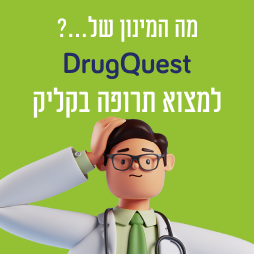Quest for the right Drug
היקמטין 0.25 מ"ג HYCAMTIN 0.25 MG (TOPOTECAN AS HYDROCHLORIDE)
תרופה במרשם
תרופה בסל
נרקוטיקה
ציטוטוקסיקה
צורת מתן:
פומי : PER OS
צורת מינון:
קפסולות ג'לטין קשיחות : HARD GELATIN CAPSULES
עלון לרופא
מינוניםPosology התוויות
Indications תופעות לוואי
Adverse reactions התוויות נגד
Contraindications אינטראקציות
Interactions מינון יתר
Overdose הריון/הנקה
Pregnancy & Lactation אוכלוסיות מיוחדות
Special populations תכונות פרמקולוגיות
Pharmacological properties מידע רוקחי
Pharmaceutical particulars אזהרת שימוש
Special Warning עלון לרופא
Physicians Leaflet
Special Warning : אזהרת שימוש
4.4 Special warnings and precautions for use Haematological toxicity is dose-related and full blood count including platelets should be determined regularly (see section 4.2). As with other cytotoxic medicinal products, topotecan can cause severe myelosuppression. Myelosuppression leading to sepsis and fatalities due to sepsis have been reported in patients treated with topotecan (see section 4.8). Topotecan-induced neutropenia can cause neutropenic colitis. Fatalities due to neutropenic colitis have been reported in clinical studies with topotecan. In patients presenting with fever, neutropenia and a compatible pattern of abdominal pain, the possibility of neutropenic colitis should be considered. Topotecan has been associated with reports of interstitial lung disease (ILD), some of which have been fatal (see section 4.8). Underlying risk factors include history of ILD, pulmonary fibrosis, lung cancer, thoracic exposure to radiation and use of pneumotoxic substances and/or colony stimulating factors. Patients should be monitored for pulmonary symptoms indicative of ILD (e.g. cough, fever, dyspnoea and/or hypoxia), and topotecan should be discontinued if a new diagnosis of ILD is confirmed. Topotecan monotherapy and topotecan in combination with cisplatin are commonly associated with clinically relevant thrombocytopenia. This should be taken into account when prescribing HYCAMTIN, e.g. if patients at increased risk of tumour bleeds are considered for therapy. As would be expected, patients with poor performance status (PS > 1) have a lower response rate and an increased incidence of complications such as fever, infection and sepsis (see section 4.8). Accurate assessment of performance status at the time therapy is given is important, to ensure that patients have not deteriorated to PS 3. Topotecan is partly eliminated via renal excretion and renal impairment might lead to increased exposure to topotecan. Dosing recommendations for patients receiving oral topotecan with creatinine clearance less than 30 ml/min have not been established. Use of topotecan in these patients is not recommended (see section 4.2). A small number of hepatically impaired patients (serum bilirubin between 1.5 and 10 mg/dl) were given intravenous topotecan at 1.5 mg/m2 /day for five days every three weeks. A reduction in topotecan clearance was observed. However, there are insufficient data available to make a dose recommendation for this patient group. There is insufficient experience of the use of topotecan in patients with severely impaired hepatic function (serum bilirubin ≥ 10 mg/dl). Use of topotecan in these patients is not recommended (see section 4.2).. Diarrhoea, including severe diarrhoea requiring hospitalization, has been reported during treatment with oral topotecan. Diarrhoea related to oral topotecan can occur at the same time as drug-related neutropenia and its sequelae. Communication with patients prior to drug administration regarding these side effects and proactive management of early and all signs and symptoms of diarrhoea is important. Cancer treatment-induced diarrhoea (CTID) is associated with significant morbidity and may be life-threatening. Should diarrhoea occur during treatment with oral topotecan, physicians are advised to aggressively manage diarrhoea. Clinical guidelines describing the aggressive management of CTID include specific recommendations on patient communication and awareness, recognition of early warning signs, use of anti-diarrhoeals and antibiotics, changes in fluid intake and diet, and need for hospitalization (see sections 4.2 and 4.8). Intravenous topotecan should be considered in the following clinical situations: uncontrolled emesis, swallowing disorders, uncontrolled diarrhoea, clinical conditions and medication that may alter gastrointestinal motility and drug absorption.
Effects on Driving
4.7 Effects on ability to drive and use machines No studies of the effects on the ability to drive and use machines have been performed. However, caution should be observed when driving or operating machines if fatigue and asthenia persist.

פרטי מסגרת הכללה בסל
א. התרופה תינתן לטיפול במקרים האלה: 1. סרטן שחלה גרורתי לאחר כשל בטיפול קודם בתרופה אחרת המיועדת להתוויה זו. 2. טיפול בסרטן ריאה מסוג small cell לאחר כשל בטיפול קודם בתרופה אחרת המיועדת להתוויה זו. 3. סרטן גרורתי של צוואר הרחם בשילוב עם Cisplatin. ב. מתן התרופה האמורה ייעשה לפי מרשם של מומחה באונקולוגיה, רופא מומחה בהמטולוגיה או רופא מומחה בגינקולוגיה המטפל באונקולוגיה גינקולוגית.
מסגרת הכללה בסל
התוויות הכלולות במסגרת הסל
| התוויה | תאריך הכללה | תחום קליני | Class Effect | מצב מחלה |
|---|---|---|---|---|
| סרטן גרורתי של צוואר הרחם בשילוב עם Cisplatin | 09/03/1999 | |||
| סרטן ריאה מסוג small cell לאחר כשל בטיפול קודם בתרופה אחרת המיועדת להתוויה זו. | 09/03/1999 | |||
| טיפול בסרטן שחלה גרורתי לאחר כשל בטיפול קודם בתרופה אחרת המיועדת להתוויה זו. | 09/03/1999 |
שימוש לפי פנקס קופ''ח כללית 1994
לא צוין
תאריך הכללה מקורי בסל
09/03/1999
הגבלות
תרופה מוגבלת לרישום ע'י רופא מומחה או הגבלה אחרת
מידע נוסף
